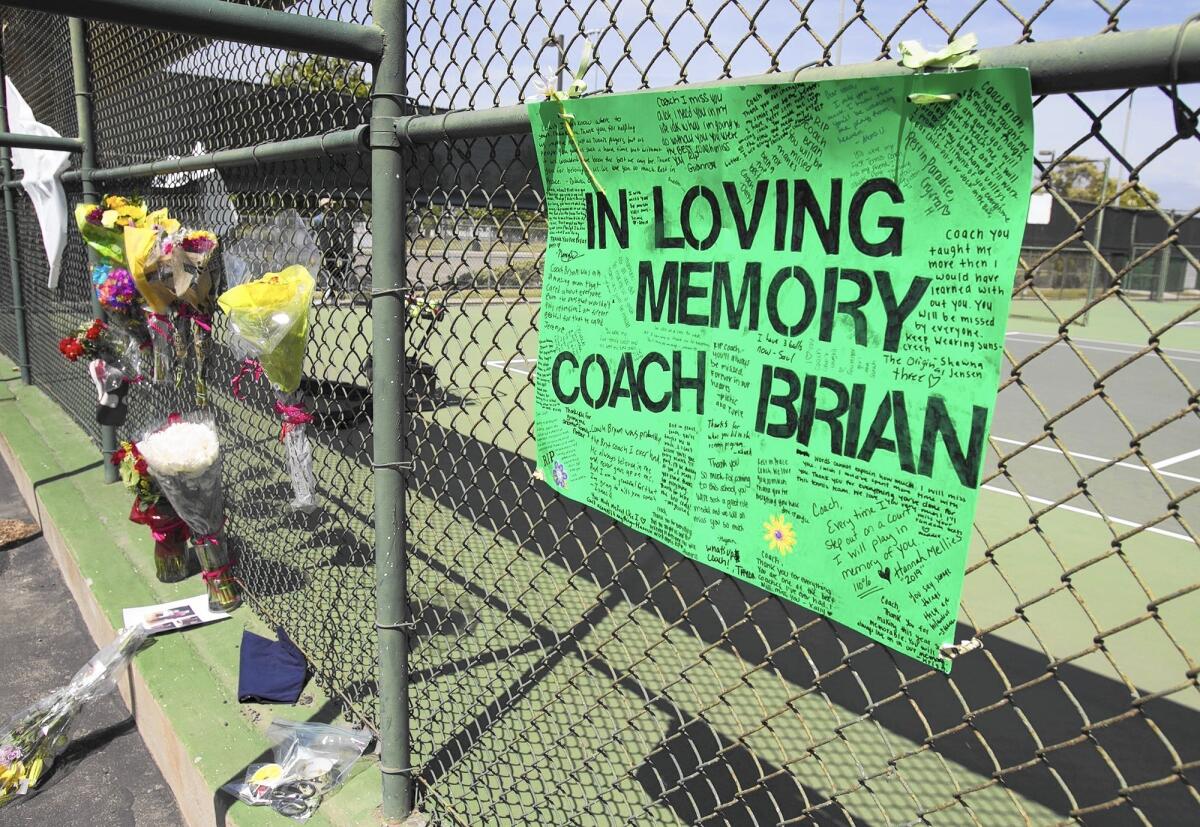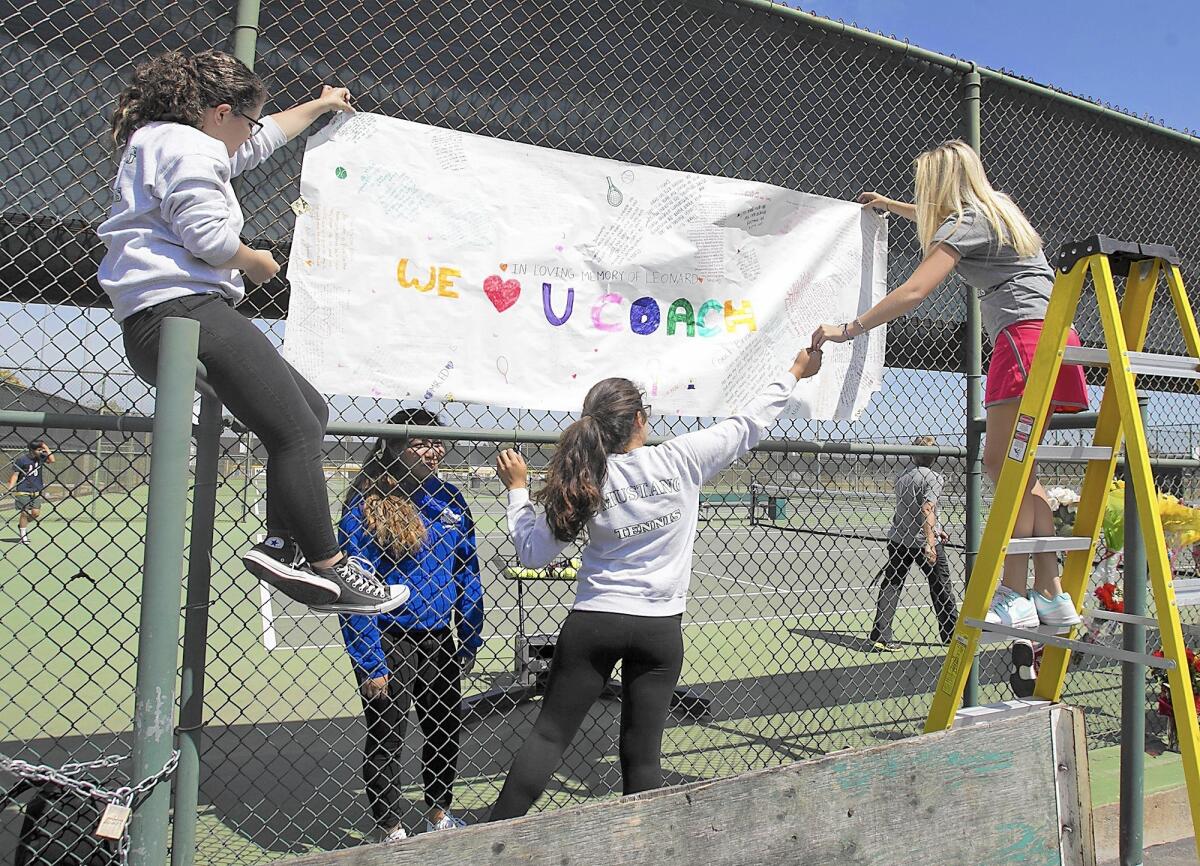Reader Report: Remembering Coach Leonard ‘Brian’ Ricker

- Share via
We’ve lost a good one; that’s glaring. But how is tragically less obvious.
Five things you might (not) want to know about Leonard Ricker, the tennis coach for Costa Mesa High and Corona del Mar before that who recently took his own life:
1.) Leonard went by Brian. When he divorced his wife, Grace, a name change was in order. A reboot. A new man. He never remarried; and he never fully recovered from that personal failure. Coupled by a falling out with his siblings and parents taken too soon, Leonard was a tortured soul, very guarded; he was an island only accessible to kids on the tennis team.
2.) Leonard spent the last year of his life homeless(ish). Caught somewhere between regret and fear — he could not reclaim the job he had left, nor could he fully commit his heart and soul to a new one. He was permanently haunted by buyer’s remorse; the hardest pill to swallow came in the form of guilt. It was his choice, his move, and he was the first one to admit it, but the last one to accept it. He called it fancy homeless. Showering at L.A. Fitness, using Starbucks cards, staying often at hotels, and holding down two jobs. He liked it; or that’s what he said. It was our secret, kept until his passing.
3.) Leonard never stopped loving the athletes he coached. During our weekly visits over the past year he cycled through a Rolodex of anecdotal memories. I would dutifully listen to them and ask (the same) questions, laugh and reminisce as he found comfort in better times long gone. The glory days. I heard them all at least twice. Or maybe 10 times, if I mentioned Mouse. He found inspiration in their careers, in their lives as adults. He was proud like a father and beamed in reflection.

4.) Leonard was a realist, and that really bothered people. He was not afraid to call it how he saw it; admittedly I did not call it how it was, only how he perceived it. He was stubborn to a fault and had many hills on which he was willing to wage war. This was particularly endearing to those aligned with his grain of thinking and painstakingly annoying to those aligned against that grain of thinking.
5.) Leonard cared way more than he would ever care to admit. He logged thousands of untracked, unpaid hours spent creating a tennis oasis: building team seating, hanging nets, hanging signs, washing courts, replacing nets, repairing fences, planting planters, stocking the shed with hot chocolate, Popsicles and licorice, emailing college coaches, and giving free lessons. He never told a soul, and never expected a dime; he did because his service could articulate the love he felt that his words and pride would not allow him to express. He loved deeply, and it was given via service.
*
Five takeaways from losing Leonard:
1.) There were not any warning signs. He died at 11:30 p.m. April 24. My last text from him was on Friday night at 9 p.m. He pulled a picture from my Twitter feed and included it with a message that read: “Coach … nice glasses!!! (thumbs up icon) Hope they help with the headaches.” He was a listener; and he knew I didn’t want glasses, that I was self-conscious about them, but my hand had been forced by chronic headaches. He addressed all three in one simple text; I felt better. I rocked those glasses. Now I don’t want to put them on. I wonder if he really wanted to text: “Coach, help me!”
2.) Human connection is unparalleled in its power to stoke the flame of one’s will to live. The human connection from coaching at Corona del Mar fostered his spirit; and with its departure so too went his vibrancy and sense of optimism. He longed for a team and culture that knew him in the same way one gets known after 11 years. He had always been solitary, but that was balanced by the heavy human connection earned through long days on the tennis courts, and trips to Fresno and Palm Desert. Leonard became increasingly reclusive over the past year. He was embarrassed. He was prideful. He was angry. But still in our time together, even last week, he maintained a paradigm rich in planning and aspiration and dreams — all of which were perfect ingredients for a blindside. I did not see this coming. I was not ready. I wonder how long this had been his plan?
3.) Mental illness is real, but it does not bleed. Isolationism is a great defense mechanism from facing the reality of one’s demons. In his isolation he was able to keep us at bay — close but not too close. He kept few friends, but I can say that I was one of his closest, and he mine. But one critical facet of our friendship was my ability to not ask too many questions. To just be there. To just listen. In our first five years our relationship was most similar to that of a father and son. Over the past three years a unique paradigm shift occurred and the roles, in many ways, reversed. The change was subtle and incremental, but concrete; I wonder if that bothered him?
4.) Regret is like a shadow. I imagine I will always wonder what I could have done differently. I imagine I will always tell myself not to blame myself right after doing so. I imagine I will always see the world slightly different. I pride myself on saving people. On changing lives. And this one slipped right past me. Zero-dark-thirty. I wonder how much work that took on his part to conceal such relentless pain?
5.) I have no actual answers; nor do I expect any. And if you’re reading this looking for one I apologize. I check my mail in anticipation of a letter of explanation from him; but I know it won’t arrive. But this is what I know: I’ve lost Leonard. I’m devastated. I’m incredibly angry at him. But I want to focus on the life led, not the way it ended.
Leonard was a strange, loving, cynical, honest, loyal and hardworking man. He was a dear friend who lost human connection and found himself trapped between the regret of leaving the reality he had and the fear of creating a new one. So use this inexplicably painful moment as a catalyst to reimagine your human connection.
Call someone. Forgive someone. Meet someone. Do something. He and I played tennis once a week. I wonder if I’ll ever play again?
--
DANIEL PATTERSON is an assistant principal at Corona del Mar High School. This piece is republished with permission from his blog, https://cdmveep.tumblr.com/post/143465184159/losing-leonard.